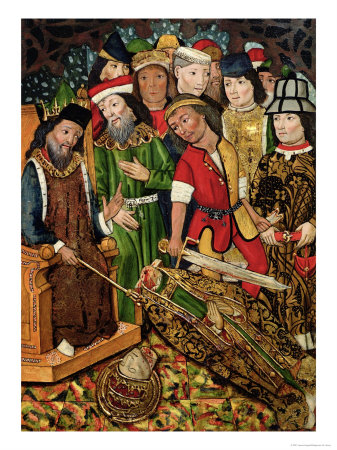A Homily by St. Gregory the Pope
Dearly beloved brethren : oftentimes do I warn you to flee evil, and to keep yourselves unspotted from the world. But today’s reading form the holy Gospel moveth me to warn you even further, namely, to exercise prudence when ye attempt to do good. Look ye well to your motives lest, when ye work righteousness, ye do it for the praise and admiration of men. For if we do things to obtain praise of men, what appeareth so fair outwardly hath nothing inwardly which deserveth reward. Behold how the Redeemer speaketh of these ten virgins.
He calleth them all virgins. Yet not all of them were received within the gates of blessedness. For some of them sought outwardly the honour of virginity, but had no substance of virginity within, for they took no oil wherewith to sustain the lamp of purity.
But first of all, it is for us to ask, What is the kingdom of heaven? And wherefore shall the same be likened unto ten virgins, whereof five were wise and five were foolish? For in the Apocalypse we read of the kingdom of heaven : There shall in no wise enter into it anything that worketh abomination, or maketh a lie. How then can it be likened unto five virgins which were foolish? But we should know that in language of holy scripture, the kingdom of heaven doth oftentimes signify the Church as she now is, touching the which the Lord saith in another place : The Son of Man shall send forth his Angels, and they shall gather out of his kingdom all things that offend. Then the Church will become that kingdom of blessedness, wherein peace shall have her perfect reign, and after that nothing that offendeth will be found for the Angels to gather out.
Now everyone hath five bodily senses, and thus the number five remindeth us of human nature. Five being doubled is ten. Forasmuch therefore as the whole body of faithful doth consist of two sexes, the whole Church may be likened unto ten virgins. And forasmuch as in the Church the good are for the present mingled with the bad, and the reprobate with the elect, it is rightly said that, of the ten virgins, five are wise and five are foolish. Many have self-control, and do keep themselves from lusting after things outward, who chastise their flesh, and are moved by homesickness for our heavenly fatherland. All such do seek an eternal reward, and scorn to receive for their labours the praise of men. These are they who reckon their glory, not in the mouths of men, but in the testimony of their own conscience. But also there are many who afflict the body by self-control, and yet, in that very self-control, do seek only the applause of men.
+ + +
Saint Martina was the virgin daughter of an illustrious Roman family, and after the death of her parents, she distributed all her wealth to the poor. Whereupon the Emperor Alexander commanded her to sacrifice to imaginary gods, and on her refusal, subjected her to unspeakable brutalities, such as scourging, putting her at the mercy of savage beasts, torturing her with fire, and other such like terrible sufferings ; and at last caused her to be beheaded. Her martyrdom occurred sometime between 226 and 228 in the Patriarchate of Pope Urban I. Her relicks were discovered on 25 Oct., 1634, in the crypt of an ancient church situated near Mamertine prison and dedicated to the saint.
 |
| Mamertine Prison |
Collect:
O God, who among the manifold works of thine almighty power hast bestowed even upon the weakness of women strength to win the victory of martyrdom : grant, we beseech thee, that we, who on this day recall the heavenly birth of blessed Martina thy Virgin and Martyr ; may so follow in her footsteps, that we may likewise attain unto thee, through Jesus Christ our Lord. Amen.











